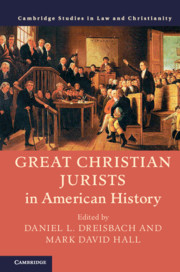Book contents
- Great Christian Jurists in American History
- Law and Christianity
- Great Christian Jurists in American History
- Copyright page
- Dedication
- Contents
- Contributors
- Preface
- Introduction: Christianity and American Law
- 1 John Cotton and Roger Williams
- 2 John Winthrop and the Covenantal Ideal
- 3 Friendly Laws: William Penn’s Christian Jurisprudence
- 4 The Friendly Jurisprudence and Early Feminism of John Dickinson
- 5 Roger Sherman, Oliver Ellsworth, and the Formation of America’s Constitutional Order
- 6 John Jay: The First Chief Justice
- 7 James Wilson
- 8 Was Justice Joseph Story a Christian Constitutionalist?
- 9 Harvard’s Evangelist of Evidence: Simon Greenleaf’s Christian Common Sense
- 10 John Marshall Harlan the Elder
- 11 Judicial Conservatism and Protestant Faith: The Case of Justice David J. Brewer
- 12 John T. Noonan, Jr.: Catholic Jurist and Judge
- 13 The Integrative Christian Jurisprudence of Harold J. Berman
- 14 Antonin Scalia: Devout Christian; Worldly Judge?
- 15 The Insights and Transitions of Mary Ann Glendon
- 16 A Reformed Liberalism: Michael McConnell’s Contributions to Christian Jurisprudence
- 17 The Jurisprudence of Robert P. George
- Index
3 - Friendly Laws: William Penn’s Christian Jurisprudence
Published online by Cambridge University Press: 24 June 2019
- Great Christian Jurists in American History
- Law and Christianity
- Great Christian Jurists in American History
- Copyright page
- Dedication
- Contents
- Contributors
- Preface
- Introduction: Christianity and American Law
- 1 John Cotton and Roger Williams
- 2 John Winthrop and the Covenantal Ideal
- 3 Friendly Laws: William Penn’s Christian Jurisprudence
- 4 The Friendly Jurisprudence and Early Feminism of John Dickinson
- 5 Roger Sherman, Oliver Ellsworth, and the Formation of America’s Constitutional Order
- 6 John Jay: The First Chief Justice
- 7 James Wilson
- 8 Was Justice Joseph Story a Christian Constitutionalist?
- 9 Harvard’s Evangelist of Evidence: Simon Greenleaf’s Christian Common Sense
- 10 John Marshall Harlan the Elder
- 11 Judicial Conservatism and Protestant Faith: The Case of Justice David J. Brewer
- 12 John T. Noonan, Jr.: Catholic Jurist and Judge
- 13 The Integrative Christian Jurisprudence of Harold J. Berman
- 14 Antonin Scalia: Devout Christian; Worldly Judge?
- 15 The Insights and Transitions of Mary Ann Glendon
- 16 A Reformed Liberalism: Michael McConnell’s Contributions to Christian Jurisprudence
- 17 The Jurisprudence of Robert P. George
- Index
Summary
Already a noted theorist and agitator on behalf of religious toleration in England when he turned his attention to American colonization, William Penn (1644–1718) played a central role in the development of liberty of conscience as a fundamental element of legitimate government. This chapter explores the foundations of Penn’s understanding of liberty of conscience and the important role he saw it playing as a foundational social, political, and legal principle. After an overview of Penn’s life and career, the focus turns to Penn’s role in the tolerationist movement during the 1670s in England and the main components of his theory as it developed over the course of his public career; his defense of representative institutions like juries and Parliament; his understanding of fundamental law; and his defense of “civil interest” as a social bond for uniting a religiously-diverse population like England and, later, Pennsylvania. The chapter concludes with a brief examination of the founding documents and early history of Penn’s colony.
Keywords
- Type
- Chapter
- Information
- Great Christian Jurists in American History , pp. 54 - 71Publisher: Cambridge University PressPrint publication year: 2019

